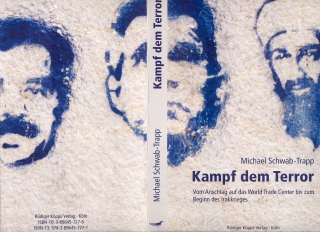
Kampf dem Terror
Vom Anschlag gegen das World Trade Center bis zum Beginn des Irakkrieges. Eine empirische Studie über die politische Kultur Deutschlands im zweiten Jahrzehnt nach der Wiedervereinigung
Author: Michael Schwab-Trapp †. With an epilogue by: Trutz von Trotha †. Series edited by: Trutz von Trotha †, Rainer Geißler.
Series: SBS Siegener Beiträge zur Soziologie Volume 7
2007329 pp.
1 table, list of publications of the author
Text language(s): German
Format: 160 x 240 mm
660 g
Paperback
€ 49.80
Buy 'Kampf dem Terror' as a downloadable PDF document directly from our online shop »
Order 'Kampf dem Terror' as print edition »
The present study examines the meaning of the German discussion about the terrorist attack of the 11 September 2001 for our understanding of war. This is done on the basis of the first reactions on the attack, the discussions about the war in Afghanistan, and the adjacent controversy in the run-up to the war in Irak. The reconstruction of the public processing of the 11 September emanate from the research leading proposition that the legitimacy of military authority and force is mainly affected by the interpretation designed by the actors of the political publicity in their discursive conflict about war and military force.
The analysis mainly concentrates on offered interpretations including more or less explicit arguments in favour or against a military reaction on the terrorist attack. Neither the background settings and reasons of the attacks nor the legitimacy and appropriateness of the sequel wars are focussed but the question of how the political reality is constructed by the affiliation of reasons, denotation of consequences, verbalisation of strategies, and the argumentation in favour of a military fight against international terrorism.
The author holds the view that the discussion about the terrorist attacks in New York and Washington are part of a more comprehensive discourse about the legitimacy of military force and war. This discourse started with the German reunification, included the discussions about the second Gulf war, the conflict in former Yugoslavia, and the Kosovo war, and changed the German political culture of war in an essential way. An extensive epilogue by Trutz von Trotha enlarges the book.
Accompanying material:
- Dezentralisierung, Demokratisierung und die lokale Repräsentation des Staates / Décentralisation, démocratisation, et les représentations locales de la force publique
(ISBN 978-3-89645-306-8 ) - Legitimation von Herrschaft und Recht / La légitimation du pouvoir et du droit
(ISBN 978-3-927620-83-4 ) - On Cruelty · Sur la cruauté · Über Grausamkeit
(ISBN 978-3-89645-731-8 ) - The Problem of Violence
(ISBN 978-3-89645-891-9 )
Cross-reference:
- Begegnungen und Auseinandersetzungen
(ISBN 978-3-89645-190-3 ) - The Multiplicity of Orders and Practices
(ISBN 978-3-89645-850-6 ) - Tuareg-Aufstand in der Wüste
(ISBN 978-3-89645-732-5 ) - Violence as Routine
(ISBN 978-3-89645-728-8 )
Reviews
Der Autor untersucht den Grad der Legitimität, die der Ausübung von militärischer Gewalt als Reaktion auf Terroranschläge zugewiesen wird. Ausgehend von der Annahme, dass – anders als in der alten Bundesrepublik – eine Militarisierung der Außenpolitik nach der Wiedervereinigung von den politischen Eliten akzeptiert wird, analysiert Schwab-Trapp Diskurse um Reaktionen auf die Anschläge in New York und Washington, den Krieg gegen den Terror in Afghanistan und den bevorstehenden Irakkrieg.
Ziel ist es, eine politische Kultur des Krieges zu entwickeln. Die Auswahl der Untersuchungseinheiten (Kommentare und Originalbeiträge von deutschen Politikern, Intellektuellen und Journalisten in ausgewählten Tages- und Wochenzeitungen sowie Protokolle von Bundestagsdebatten) wird damit begründet, dass die Legitimität militärischer Gewalt maßgeblich von den Deutungen geprägt wird, die die Akteure der politischen Öffentlichkeit in ihren diskursiven Auseinandersetzungen über Krieg und militärische Gewalt entwerfen (9). Der Autor weist in seinen empirischen Studien nach, dass es einen grundlegenden Wandel der politischen Kultur (im diskurstheoretischen Sinne) in Deutschland gegeben hat.
Jörg Jacobs in Zeitschrift für Politikwissenschaft, 4/2007, 1334
| « back | Print version | [top] |
 Books
Books Audio
Audio Biographies
Biographies Series
Series Festschrifts
Festschrifts Journals
Journals